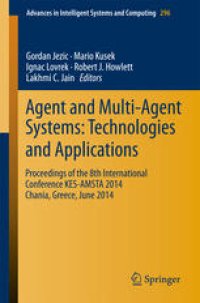
Ebook: Agent and Multi-Agent Systems: Technologies and Applications: Proceedings of the 8th International Conference KES-AMSTA 2014 Chania, Greece, June 2014
- Tags: Computational Intelligence, Computing Methodologies
- Series: Advances in Intelligent Systems and Computing 296
- Year: 2014
- Publisher: Springer International Publishing
- Edition: 1
- Language: English
- pdf
Agents and multi-agent systems are related to a modern software paradigm which has long been recognized as a promising technology for constructing autonomous, complex and intelligent systems. The topics covered in this volume include agent-oriented software engineering, agent co-operation, co-ordination, negotiation, organization and communication, distributed problem solving, multi-agent communities, rational and clustering agents, learning paradigms, agent cognitive models, and heterogenous multi-agent environments.
The volume highlights new trends and challenges in agent and multi-agent research and includes 30 papers classified in five specific topics: Modeling and logic agents, Knowledge based agent systems, Cognitive and cooperative multi-agent systems, Agent-based Modeling and Simulation, and Learning Paradigms and Applications: Agent-based Approach. The published papers have been presented at the 8th KES Conference on Agent and Multi-Agent Systems – Technologies and Applications (KES-AMSTA 2014) held in Chania on the island of Crete in Greece in June 2014.
The presented results will be of value to the research community working in the fields of artificial intelligence, collective computational intelligence, robotics, dialogue systems and, in particular, agent and multi-agent systems, technologies and applications.
Agents and multi-agent systems are related to a modern software paradigm which has long been recognized as a promising technology for constructing autonomous, complex and intelligent systems. The topics covered in this volume include agent-oriented software engineering, agent co-operation, co-ordination, negotiation, organization and communication, distributed problem solving, multi-agent communities, rational and clustering agents, learning paradigms, agent cognitive models, and heterogenous multi-agent environments.
The volume highlights new trends and challenges in agent and multi-agent research and includes 30 papers classified in five specific topics: Modeling and logic agents, Knowledge based agent systems, Cognitive and cooperative multi-agent systems, Agent-based Modeling and Simulation, and Learning Paradigms and Applications: Agent-based Approach. The published papers have been presented at the 8th KES Conference on Agent and Multi-Agent Systems – Technologies and Applications (KES-AMSTA 2014) held in Chania on the island of Crete in Greece in June 2014.
The presented results will be of value to the research community working in the fields of artificial intelligence, collective computational intelligence, robotics, dialogue systems and, in particular, agent and multi-agent systems, technologies and applications.